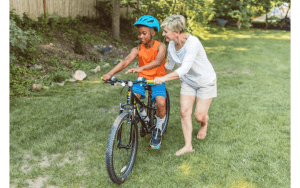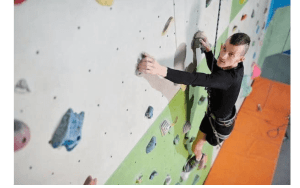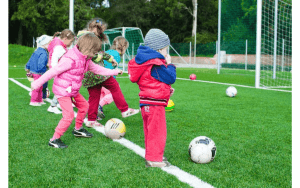How ‘Helicopter’ Parents Cause the Mental Health Crisis in Today’s Young Generation?
 “Helicopter Parents,”
“Helicopter Parents,”
Cosseting parents or Helicopter Parents sometimes known as “helicopter parents,” pay great attention to their children’s difficulties and struggles in school. They are notorious helicopter parents who meddle in every aspect of their kids’ lives.
Just as millennials entered college, “helicopter parenting” became popular. Some people, known as “helicopter parents,” follow their children like hawks to shield them from harm and ensure their success in life.
Dave Ramsey, the founder of Ramsey Solutions, thinks his daughter is “well-prepared for life” because of his and his wife’s decision to charge rent.
Struggling with Mental Health
Kids and teens are struggling with mental health in America, and one new report suggests the overinvolvement of parents may be partly to blame.
Kids don’t get to roam anymore.
They’ve lost time for free play and risk-taking amid parents’ fears about the world’s dangers, said report co-author David Bjorklund.
While people think the lack of independence and the growth in mental health issues is new, it’s been a lot more gradual, said Bjorklund, a professor.
Learn How To Keep Your Students Engaged
“It’s Not a New Phenomenon.
It’s a growing one. And it’s been growing for decades,” Bjorklund said. The authors said the trend emerged in the 1960s and accelerated in the 1980s. Some eventually dubbed the trend “helicopter parenting.”
According to the Paper


Adults were well-intentioned in wanting to protect children, but this has deprived kids of the independence they need for mental health. And now, young people are experiencing high anxiety, depression, and suicidal ideation.
A group of doctors from the American Academy of Pediatrics came together with a statement in 2021. to the White House, that child and adolescent mental health be declared a “national emergency.”
Last month, the U.S. Centers for Disease Control and Prevention
reported on the results of a 2021 survey that found 57% of teen girls felt persistently sad or hopeless. Those numbers are double the number of teen boys experiencing sadness or hopelessness.
A Child With A Helicopter Parent
“Helicopter parent” refers to parents who are overly involved in their children’s daily activities. Young children need parental monitoring, control, and guidance to learn the world’s laws.
Still, these parents are doing so in a counterproductive way to their growth and development.
Helicopter parents are always hovering over their kids. They keep their kids in line and insist on doing things with them that they should be able to do independently. Parents risk their safety to help their kids when they encounter trouble.
The New World of Semipermanent Makeup and Beauty
Parenting via Helicopter: Real-Life Examples


Some instances of “helicopter” parenting at various ages are provided below.
- It makes sense to shield toddlers from harm at that age. On the other hand, overprotective parents may constantly follow their children. They demonstrate the “proper” usage of the toy and correct their children if they try to use it in any other way.
- The youngster lacks the freedom and independence to explore and learn independently. These parents monitor their children’s interactions with other children and instruct them on how to behave when playing with others.
- Parents worry excessively about their children’s safety, even though minor injuries like scrapes and falls are part of the developmental process for toddlers learning to walk. Even a minor scrape on the knee can cause them a great deal of anxiety.
- Some parents, known as “helicopter parents,” will stop at nothing to ensure their elementary school-aged children have the best possible teachers and schools. She doesn’t just keep an eye on her kid; she actively participates in their schoolwork and projects.
- A parent who hovers too closely over their middle schooler may choose their child’s best buddy and extracurricular activities. They often ignore what they want because they are sure they do what is best for their children.
- A parent may choose to do the legwork of finding and vetting potential colleges for their high school senior. When their child applies to universities, they closely monitor the process. If their child was rejected from their preferred school, they might even try to get an explanation from the admissions office.
- Parents may help their college-aged children by doing their work for them or getting them extensions on their deadlines. They appeal to the university’s top brass, the dean, or the teacher, disputing their child’s low marks. They might even take their youngster to an interview or job fair.
Consequences of Overprotective Parents


Several studies have identified positive and negative results connected with “helicopter parenting” despite the disproportionate negative image in popular media. Let’s look at the positive and negative effects of helicopter parents.
Amazon is Still Trying to Crack the Physical Grocery Code.
The Pros – Helicopter Parenting’s Beneficial Outcomes
- Educators have widely acknowledged the value of parents being involved in their children’s education. One of the advantages of “helicopter parenting” is that it encourages responsible parental engagement. It’s essential for the student’s overall academic and personal growth.
- Parental participation has been shown to boost a child’s academic performance in several areas, including their attitude toward school, their homework habits, their likelihood of missing class, and their likelihood of dropping out altogether.
- The effects of parental participation on college students’ growth in areas like alcohol use, decision-making, life skills, physical health, mental health difficulties, and career development have recently been studied and shown to be good.
- The parents’ extensive help in many areas, including money, counsel, and mental well-being, has been invaluable. Children who grow up with “helicopter” parents who are always there for them tend to be happier and more well-adjusted adults.
Cons – Drawbacks Associated with Helicopter Parenting
Contrary to the findings on parental participation, overprotective parenting has been linked to unfavorable outcomes in children’s mental health.
- Parents who become overly involved in their children’s schooling before they are ready have been linked to poorer mental health in their offspring. Substance misuse and mental health issues are more common among them.
- Young adults and teenagers are hit the worst. These kids haven’t had to deal with the harsh realities of life since they were toddlers. They have difficulty developing independence and tend to be more neurotic. They worry about failing all the time, lack of confidence, and inability to deal with regular stresses.
- Higher narcissism and a sense of entitlement have been linked to helicopter parenting in adult children.
- Children whose parents are the primary motivators for furthering their education tend to depend more on external rewards for doing well in school.
- Dad watches his son as he writes. Parenting by helicopter is distinct from parenting by the lawnmower.
Is it good nature or bad to be a helicopter parent: thoughts?
What is Bipolar II Depression? Psychopharmacologic Treatment of Bipolar II Depression
Why do studies on “helicopter parents” provide such conflicting findings?


One reason for this discrepancy is that “helicopter parenting” lacks a clear psychological definition. There is no commonly accepted definition of helicopter parenting, unlike the four Baumrind parenting approaches. As a result, positive and negative outcomes are associated with this parenting style, as shown by studies utilizing various criteria.
By analyzing the divergent viewpoints, experts have concluded that the impact of “helicoptering” on a child depends not on the parent’s level of participation but on the child’s perception of that involvement.
The good news for overprotective parents is that they can adjust their parenting style to promote rather than hinder their children’s healthy growth.
The theory of self-determination can be used to make sense of this observation. Three fundamental psychological demands are identified in the Self-Determination Theory: autonomy, competence, and relatedness.
A person’s health and happiness improve when these requirements are met. They have an innate drive to succeed and the capacity for personal improvement.
These requirements can be met in a nurturing home setting if the child is given the autonomy to make decisions and feel supported. Parents who encourage their children to make decisions and find solutions independently do not micromanage them.
These kids are more self-reliant and assured of adapting to and thriving in their new surroundings. Children raised in this way are better able to cope with their environment.
But those requirements can’t be met in a family that restricts individuality. Children whose parents are overbearing may feel powerless in their own lives. The results are usually worse for them.
Supporting the child’s autonomy does not entail putting up with inappropriate behaviour. This means the child sees the parent as permissive and actively promoting autonomy.
If the child views the “helicoptering” as supporting rather than controlling, it can be a positive experience. No matter how loving a parent is, they can’t help their child develop to their full potential if the child has no sense of control over their environment.
Parents knead their daughter to make sure she doesn’t mess up. Typical examples of “helicopter” parents


Negative Effects on Children’s Emotional Development
Researchers who have tracked children of overly involved parents discover that the effects of this type of parenting are only sometimes positive. Negative effects on children’s emotional development due to overprotective parents include:
The Reality of Abusers, Abuse, and What to Do
Reduced intellectual and social progress.
Two groups of children, aged 2 and 10, were studied separately. Those whose parents were more authoritarian also struggled more with self-control. As a result, children of “helicopter” parents were falling academically behind their peers by the time they were ten.
Disorders of the Mind.
According to some studies, helicopter parents may be increasing their children’s vulnerability to mental health problems. Children’s autonomy might be undermined when their parents constantly rescue them.
Youngsters may develop the impression that their parents do not have faith in their abilities. Overly involved parents are associated with an increase in the problems of stress, depression, and anxiety in their college-aged children.
Burnout
Helicopter parents put their older children at a higher risk of academic burnout. They feel guilty if they don’t succeed, partly because they care about their parent’s ambitions and they don’t want to disappoint them.
The Deficit in Inhibitions.
Another problem is that these pupils need help to self-regulate. Young adults who have grown accustomed to their parents’ micromanagement may be unprepared for the demands of adulthood. They may find the transition to adulthood and college difficult if they have not developed effective emotional coping techniques.
Helicopter Parents: The Solution


The vast majority of “helicopter” parents mean well. The happiness and prosperity of their children is a goal all parents share. They intend to support their children as they grow into young adults.
However, such parents are typically perfectionists whose priority as parents is their children’s achievement. They, in turn, become micromanaging parents. Therefore, their “assistance” or “support” becomes oppressive.
Elon Musk; Short Life Story of the Boy Who Change The World
Assisting and Controlling
The key to escaping helicopter parents is distinguishing between assisting and controlling. Being a helpful and supportive parent is fine, but crossing the line into micromanaging their every action is not.
Our children will not have their lives derailed because they got a bad grade, went to the wrong college, were cut from a team, or bombed a job interview. On the contrary, they’re valuable life lessons that, with our help, our kids can benefit from.
The child’s well-being suffers when one parent exerts excessive control, and the parent-child connection suffers when one parent is overbearing. A childhood filled with love and care best indicates a child’s future success.
School Pressures Play a Role.
Too much schoolwork is a part of this mental health decline, according to an article published online recently in the Journal of Pediatrics. The school year increased by an average of five weeks between 1950 and 2010, and homework is common, even for small kids.
Recess, meanwhile, averaged just 26.9 minutes in a school day in 2014, the authors said.
Yet Another Challenge to a Youngster’s Mental Health:
intense pressure to achieve at an early age, especially in middle-class families planning on college, Bjorklund said.
Having opportunities for independent play, self-directed activities, and contributing to their families helps children feel trusted, responsible, and capable, Bjorklund said.
Playing


“Play is important, and that’s the concept that some people find hard to believe,” Bjorklund said.
Play is, by definition, not serious, he said. Yet scholars who study play believe it “plays a really important part in children’s healthy development, social development, mental development, emotional development. It’s been taken for granted for too long,” Bjorklund said.
From play and independence, children gain a sense of autonomy, a feeling that what they do makes a difference, Bjorklund said.
It also gives them a feeling of competency.
“It’s better for everyone if we have a sense that we are important agents in our own lives, that we’re competent, at least at some things,” Bjorklund said.
The Importance of Play
The need for more opportunities for unstructured play is just one of many different issues likely affecting children’s mental health, said Jill Emanuele, vice president of clinical training for the Child Mind Institute in New York City. Emanuele was not involved in this commentary.
Emanuele also made a distinction between play time and spending downtime on screens.
“It’s a Crucial Part of Children’s Development.
They learn cognitive, social, linguistic, and physical skills. They learn risk-taking. They learn social skills, how to interact with other kids, and also self-regulation and management. They learn how to be creative. They learn how to imagine,” Emanuele said of playtime. “That independent way that they can build their world and build all these skills is so very important.”
In Terms of Risk-Taking,


Emanuele uses the metaphor of teaching kids to ride a bike, that eventually, you have to take your hand off the bike and let them ride or fall.
From her observations, Emanuele said, “Parents are much less willing to let their hands off the bike. And some kids aren’t able to fall and learn for themselves, have that experience, and deal with failure.”
Independence
Perhaps parents need to be taught to encourage more independence in their kids and to maintain healthy boundaries while allowing some independence in play, Emanuele said.
Bjorklund said the first step in trying to solve the issues raised in the study is acknowledging the need.
He said that Parents could work with a few other parents to give their kids more independence to walk to the store together or even to play in one child’s yard and bring in the adults in an emergency.
Parents could also petition schools to restore longer recess.
Among the types of risky play that the authors noted is climbing high into a tree. According to the report, this helps protect kids from developing phobias and reduces anxiety by boosting self-confidence in dealing with emergencies.
It’s an Issue that Requires Balance.


Of course, parents need to not be irresponsible and to keep kids safe, Bjorklund said, noting they need to temper that with opportunities to help children be independent.
“Risk is Cost and Benefit
And when we take risks and succeed, there’s often great benefit,” Bjorklund said. “We want to moderate the risks, of course, for our children. But we don’t want to prevent them from engaging in it.
For more detail click here,





wonderful please provide furthor information about parents